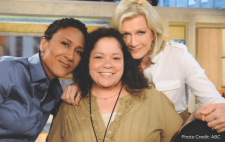Photography by David Michael Howarth
Mary i hasn’t left her home since the pandemic started. Alongside her partner Nancy Schroeck, she’s spent the last year on her 13-acre Mullica Hill farm planting herbs, growing vegetables, picking berries and raising chickens.
But they’ve been far from isolated. Since last May, their farm, Sunshine Farm and Learning Center, has been a temporary home for off-the-beaten-path, pandemic-weary travelers looking for an escape.
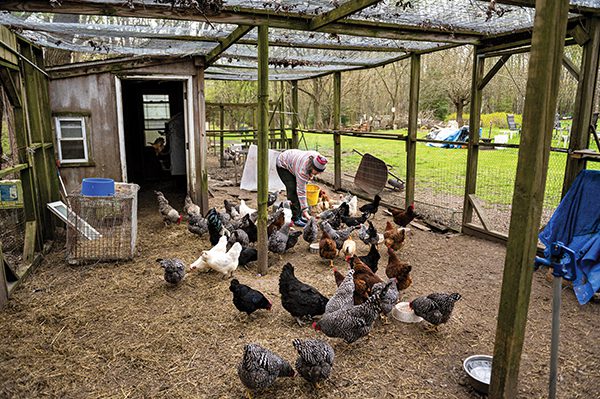
“When the pandemic hit, so many people needed a place to go,” says Mary. “They were confined in their apartments and needed fresh air, or they lost their jobs and needed to feel useful. They wanted to learn how to grow their own food, how to work with their hands.”
Mary understands that feeling. Her father was the fire department chief in Camden, and she grew up feeling suffocated by city life. She bought the farm 41 years ago when she was 27, working to build it acre by acre while pursuing her career as a musician and event entertainer. (She legally changed her full name to Mary i – lowercase i and all – for a more memorable stage name.) She helped build the farmhouse with her own 2 hands because “it’s hard to get a mortgage when you tell the bank you’re a professional clown,” she says.
Schroeck arrived 5 years ago, then just a friend of a friend who came to help Mary maintain a Native American medicine wheel which was placed on the property in 1992 by Spokane’s Native American Bear Tribe. The 2 hit it off immediately, and Schroeck moved in.
But with Mary about to turn 69 and Schroeck in her mid-50s, they knew the farm needed more work than they could handle on their own. That’s when they found WWOOF.
WWOOF (World Wide Opportunities on Organic Farms) connects farms around the world with people who want to work and learn. Founded in 1971, it’s one of the world’s first educational and cultural exchange programs and encompasses over 1,700 organic farms, ranches, gardens, vineyards and homesteads in more than 130 countries – including South Jersey.
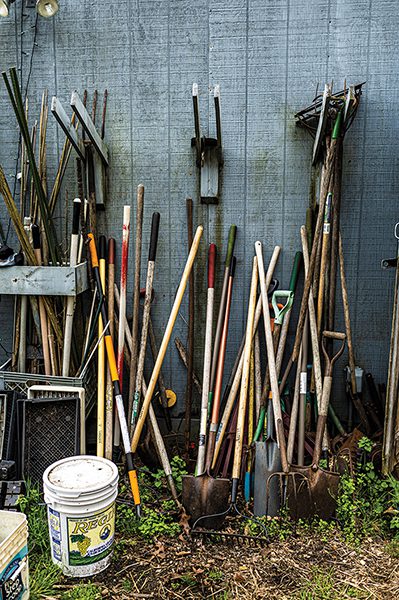 Travelers (also known as WWOOFers) work up to 30 hours a week on the host farm, and in return they get sleeping accommodations, meals and learning opportunities. There is no minimum or maximum stay, and no one gets paid.
Travelers (also known as WWOOFers) work up to 30 hours a week on the host farm, and in return they get sleeping accommodations, meals and learning opportunities. There is no minimum or maximum stay, and no one gets paid.
So in May, Mary and Schroeck converted an old storage barn into housing and set up a courtyard for travelers to enjoy socially distant meals. In the year since, Sunshine Farm has welcomed visitors of every age and walk of life – from 18-year-old city kids to 60-year-old nature-lovers from hundreds of miles away. Some have stayed as long as 2 months, while others come for a day or weekend at a time. All come with different interests, backgrounds and experiences. When they welcomed their first WWOOFers who had plumbing experience, they added handwashing stations and an outdoor shower. Others helped make new paths in the woods, tend the garden or care for the newborn chicks born last summer. Many had no farm experience at all.
“These kids come here and I have to ask, ‘Do you know how to use a wheelbarrow? Can you recognize different tools?’” says Mary. “It’s amazing how many people don’t know how to use a hoe or a rake.”
But it’s not free labor – far from it, she says. In exchange for work, the women of Sunshine Farm provide 3 meals and snacks as well as constant learning opportunities. They demonstrate how to feed the chickens, how to use farm tools, how to plant and care for herbs. They teach how to build rich, fertile soil, propagate plants, make compost, store food for winter and much more. Mary often hands out informational printouts, has her WWOOFers take notes and quizzes them along the way.
“Teaching is something I can do,” says Mary. “In exchange, I get people with strong backs who can move a mulch pile in an hour when it would have taken me 5.”
They typically host up to 4 or 5 visitors at a time, mostly in the summer and early fall. At first, they were concerned that people would take advantage of them – using them for a free meal and a place to stay without doing the work. But that notion was quickly dispelled.
“Personality wise, we get a lot of really happy, inquisitive people,” says Mary. “They want to learn how to grow their own food, especially after Covid when they didn’t have many fresh vegetables on the shelves.”
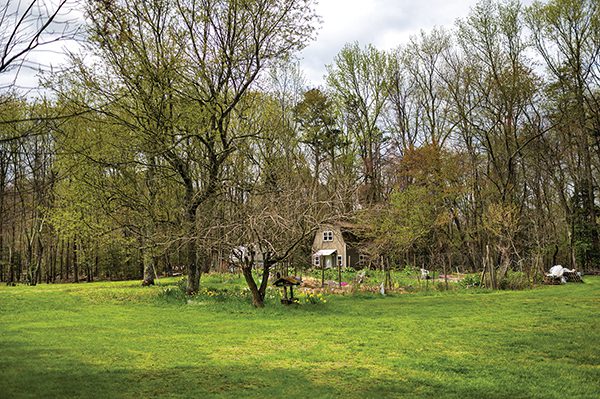 Part of that, though, is by design. They don’t allow just anyone to come live and work with them. When someone on WWOOF expresses interest in visiting their farm, Mary hops on Zoom to ask a few questions. Some are simple – do they have any food allergies? Can they tolerate heat and humidity during the day or low temperatures in an unheated barn at night? Others ensure that it’s a good fit.
Part of that, though, is by design. They don’t allow just anyone to come live and work with them. When someone on WWOOF expresses interest in visiting their farm, Mary hops on Zoom to ask a few questions. Some are simple – do they have any food allergies? Can they tolerate heat and humidity during the day or low temperatures in an unheated barn at night? Others ensure that it’s a good fit.
“We always ask what people are coming out here to learn,” says Mary. “If you want to learn how to work with animals or how to build, we aren’t the place for you.”
But despite the screening, there have been a few hiccups. One couple brought a camper to stay the entire summer but lasted only a week after they found their first tick. Another young man was brought by his uncle, who hoped the farm would help straighten him out, but because there is a strict no drug, marijuana or smoking rule at Sunshine Farm, he was asked to leave.
For those who have stuck around, Sunshine Farm became a much-needed change of pace and a chance to grow, says Mary. When the workday is done, many go off on their own to do yoga in the farm’s fairy grove or write, draw and paint in the fields. The women also offer spiritual healing programs like full-moon get-togethers and Native American drum circles. Some take trips to the surrounding downtown areas, breweries or even down the shore, while others prefer to be alone in nature.
“Every day and every farm was different. Everywhere I went, I learned something new.”
WWOOF’s more than 13,000 members worldwide join the organization for a variety of reasons. Some use it as a way to travel the world and gain life experiences – hopping from a ranch in Wyoming to an olive oil farm in Spain or a tulip farm in the Netherlands. That’s how it started for Elizabeth Degener – a way to experience the world. But without knowing it, it would lead her right back home and set the course for her entire career.

Lines form for the Cape May Bread Lady early in the morning
Degener is also known as the Cape May Bread Lady – a James Beard-nominated baker whose farmhouse breadstand routinely (and quickly) sells out of the just 150 loaves baked fresh in the morning. She grew up on Enfin Farms, a 23-acre organic produce farm in West Cape May that her grandparents bought in the 1940s. Now it’s where locals and foodies wait in impossibly long lines to snag chocolate candied ginger lavender bread or maybe a loaf of smoked chili and onion or oatmeal molasses.
It’s her family homestead, but she never planned on ending up back on the farm. Degener, who studied International Relations at the Irish American University in Dublin, wanted to travel the world. WWOOF was a cheap, exciting way to do just that, she says. Any time she had off from school she’d jet off to farms around the world – landing in Belgium, France and India along the way.
“Every day and every farm was different,” says Degener, now 34. “Everywhere I went, I learned something new.”
But it was a farm in Germany that set her on her path, even if she didn’t know it at the time.
“They call it an eco-community or a care farm, where the government gave subsidies to farms to take in people dealing with stress or anxiety as a part of their therapy,” says Degener, who spent 5 months there during her senior year of college. “We all contributed in our own way. They had a clay oven to bake bread, and that’s where I learned to bake.”
When she came home to Cape May, she took what little money she had – some $3,000 – to buy a clay oven of her own.
“I didn’t have this great vision, and I didn’t know I wanted to make a career out of it,” she says. “I figured if people want bread, I’ll bake it. If there’s no demand, I’ll close or pivot or change my business. I was young, and I didn’t overthink things. I just wanted to try it out.”
And it took off. Within a year, word-of-mouth had dubbed her the “Cape May Bread Lady.” The James Beard Awards – what many consider the gold standard of chef awards – named her a semifinalist for bakers across the country in 2017. “Not that I have any idea how they found out about me,” says Degener. For some, that would have prompted them to scale up the business. But she didn’t want to lose the simple lifestyle she came home from Europe to pursue.
“I do this because I get to come out here every day, be alone, make things with my hands that other people will enjoy and just live simply.”
Now that she has a baby and another on the way, her whole life is consumed by doing less, she says. The lessons she brought back from her WWOOF experience still hold true: there is “a beauty and happiness in simplicity,” she says.
WWOOF isn’t always meant to be a life-changing experience, Degener adds – it can just be a way to try something new for a day if that’s all you’re looking for. But for Degener and the women at Sunshine Farm, it’s had a lasting impact. “
Coronavirus really threw us for a loop and threatened everything we had,” says Mary. “But instead, we’ve found a way to grow. Without these people coming in, we never would have been able to do what we’re doing now. Not on this level. And we hope we’re giving them some good memories from South Jersey too.”


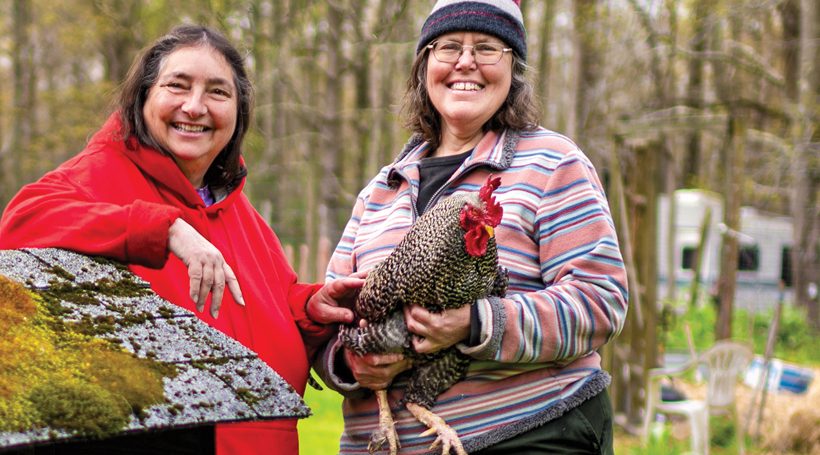
 “Every day and every farm was different. Everywhere I went, I learned something new.”
“Every day and every farm was different. Everywhere I went, I learned something new.”


